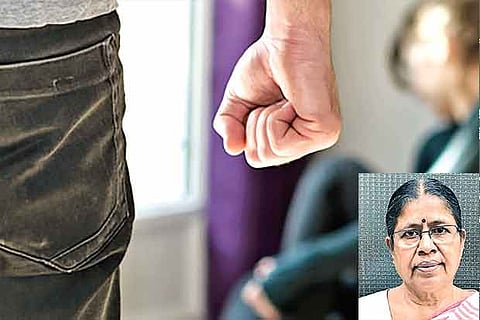

Chennai
Matrimony or relationships in the nature of matrimony is no more a matter of mind, feelings and emotional values. In these days of consumerism, matrimonial bonds are weighed in terms of money, it’s worth and the legal remedies made available when the relationship gets strained. The matrimonial acts of marriage and divorce based on their religions such as the Hindu Marriage Act, The Divorce Act, the secular Special Marriage Act and the provision of providing maintenance under Section 125 Cr. P.C. or the Hindu Adoptions and Maintenance Act do not provide sufficient explicit protective remedies to women and children in domestic relationship.
The Protection of Women Against Domestic Violence Act (DV Act in short) was passed in 2005 after a long struggle by women’s rights organisations for securing speedy remedies to combat domestic violence.
Any application under the DV Act is filed before the Judicial Magistrate within whose jurisdiction the domestic violence is committed or the victim woman lives. So on the face of it the Act seems to be a criminal act dealing with the offence of domestic violence.
But in fact, the objects and reasons of the DV Act says, “The phenomenon of domestic violence is widely prevalent but has remained largely invisible in the public domain. Presently, where a woman is subjected to cruelty by her husband or his relatives, it is an offence under Section 4980A of the Indian Penal Code. The civil law does not however address this phenomenon in its entirety.”
It further adds, “It is, therefore, proposed to enact a law keeping in view the rights guaranteed under articles 14, 15 and 21 of the Constitution to provide for a remedy under the civil law which is intended to protect the woman from being victims of domestic violence and to prevent the occurrence of domestic violence in the society.”
Thus even a casual reading of the objects would make it clear that the DV Act is civil in nature and not criminal. This was made explicit by Justice G Rajasuriya is his judgment on October 28, 2010, in Vijaya Bhaskar and others vs Sarnya Devi, where he says, “The object of the Act is that the victim lady should be enabled by law to live in the matrimonial family atmosphere in her husband/in-laws’ house. It is not the intention of the said enactment to enable the lady to get snapped once and for all her relationship with her husband or the husband’s family and for that, civil law and civil remedies are most efficacious and appropriate and keeping that in mind alone in the Act, the initiation of action is given the trappings of civil proceedings which the authorities including the Magistrate responsible to enforce the said Act should not loose sight of.” The Gujarat High Court also concurs with the above view, “Though the expression ‘violence’ connotes criminality referable to criminal mindset, the object of act being to assist the aggrieved person suffering from domestic violence by providing to her various reliefs as above and the act of domestic violence not being punishable under DV Act, it cannot be said that mere use of expression ‘violence’ would render the applications under Sections 12, 17 to 4 of the DV Act as criminal proceedings. The fact that the civil remedies are provided to aggrieved person is also made eloquent by objects and reasons of this law as well.” It is to ensure that there is speedy and effective remedy for the victims of domestic violence that the cases under the DV Act is to be dealt with by the Judicial Magistrates. Even a casual perusal of disposal rates of DV cases before the Judicial Magistrates shows that they are not dealt with any special speed. We have DV cases pending for more than two years before the Judicial Magistrates.
Family Courts Act, 1984 stipulates that any proceeding between parties to a marriage as to matrimonial status, maintenance / alimony, property, guardianship, custody of children etc. be dealt with by the Family Courts which shall be constituted in every district.
All family matter including maintenance issues under Section 125 Criminal Procedure Code (Cr.P.C). which were taken up by Judicial Magistrates have been assigned to the Family Courts with the Family Court Judges who are District Judges being also designated as a Judicial Magistrate for the purposes of dealing with cases of maintenance under Section 125 Cr.P.C. Presently if any case is pending in the Family Court between spouses then as an interim measure in the said case issues arising out of DV Act are also filed. But they do not lie independently. So much so when a victim prefers a complaint before the Protection Officer under the DV Act, it is filed before the Judicial Magistrate for redressal.
The Judicial Magistrates’ deal with the cases under the DV Act in accordance with the CrPC and so inadvertently or routinely treat the case as a criminal case. The petitioner becomes the complainant and the respondent becomes the accused. The adversarial proceedings are not in the spirit of the DV Act. The rift becomes unbridgeable and escalates with more venom and multiplies the litigation with a criminal colour.
Now that Family Courts have been established in almost all districts of the state with specialized counselling and mediation facilities it is only just and proper that the Family Courts are conferred the sole jurisdiction to take up issues under the DV Act. This will avoid multiplicity of litigations in various forms and forum shopping with vindictive motives.
— The writer is Senior Advocate, Madras High Court
Visit news.dtnext.in to explore our interactive epaper!
Download the DT Next app for more exciting features!
Click here for iOS
Click here for Android